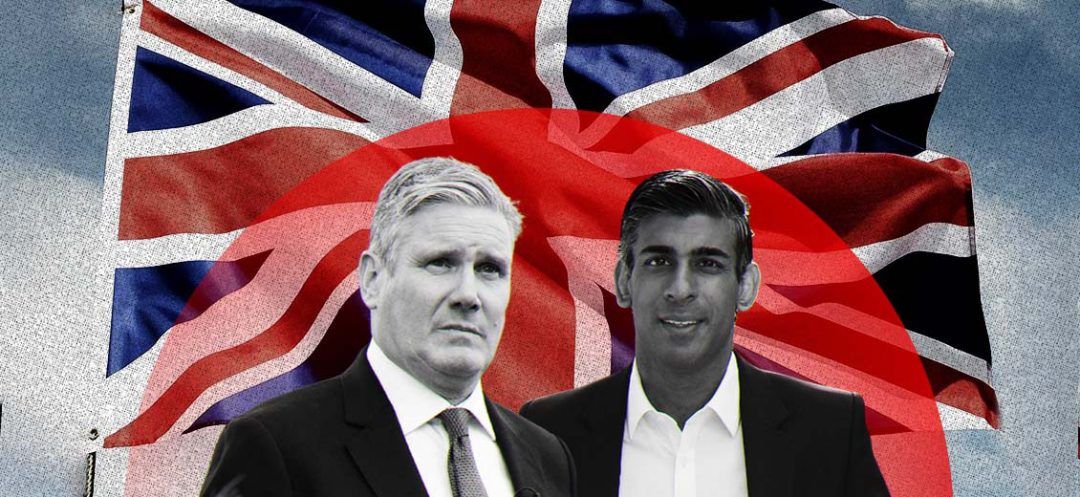- Home
- Middle East
- What if Keir Starmer Is Elected British Prime Minister?

What if Keir Starmer entered 10 Downing Street on July 4? Since Prime Minister Rishi Sunak called for early general elections, the leader of the opposition and of the Labour Party has been eyeing the realistic chance of winning and putting an end to 14 years of consecutive Conservative rule. Currently leading in the polls, Starmer stands at a pivotal juncture as his beliefs, ideas and proposals are under intense scrutiny by a nation eager for change.
But what do we really know about Keir Starmer and his vision for Britain? Beneath a facade of pragmatism and moderation, is Starmer merely a standard-bearer for traditional Labour ideologies that champion state intervention and unchecked public spending? Many observers fear that the specter of rampant socialism, which could wreck the British economy and stifle entrepreneurial spirit, looms large over his propositions.
Can we realistically believe that Keir Starmer will restore Britain’s former glory on the global stage, while he seems ready to plunge the country into a maelstrom of regulations and taxes? Will he be the savior of a declining nation, or the architect of its downfall under the weight of a sprawling and ineffective bureaucracy? Can we truly envision Starmer–if his ideas are disconnected from pragmatic realities–reconciling a fragmented society and revitalizing a faltering economy? What about his foreign policy? Will it mirror the controversial stance of his predecessor, Jeremy Corbyn? 10 Downing Street may soon welcome a man whose actions could shape the future of the United Kingdom.
As a potential head of the British executive, Keir Starmer will confront a disillusioned and skeptical nation. Will he revitalize Britain or steer it into the pitfalls of destructive socialism? Uncertainty lingers, yet the concern is palpable: history may judge his tenure in power quite severely.
To better grasp the likelihood of Keir Starmer's victory, it's worth examining his propositions, if indeed there are any. Regarding the economy and purchasing power, the Labour Party’s stance is rather vague. They pledge no hikes in income taxes, VAT or national insurance. Shadow Chancellor of the Exchequer Rachel Reeves even asserted in an interview with the British news channel Sky News that taxes wouldn't rise by the end of the parliamentary term 2024-2029, and might even decrease. But how would this be possible for a party that takes over unfunded investment promises, aims to significantly increase spending and has no plan to control public debt?
Conventionally, the monetary system dictates that to finance all these expenditures, there would need to be either an increase in social contributions (taxes) or borrowing—neither of which would align with the Bank of England, whose goal is to reduce the public debt that reached astronomical levels during the COVID-19 crisis. Estimates by the Office for Budget Responsibility indicate that at least an additional £25 billion in annual borrowing would be needed to fund the Labour program. The ambiguity surrounding these economic propositions, combined with the promise of unchanged or reduced taxes, raise serious questions about the viability and credibility of the Labour Party's plans. The appealing rhetoric of Starmer and his colleagues fails to mask the lack of concrete and realistic solutions for a stable and prosperous economic future.
A second major concern for British voters is the healthcare system and the unrelenting waiting lists within the NHS (National Health Service). While the current Prime Minister, Rishi Sunak, acknowledged his failure to deliver the anticipated and essential results in this regard, Keir Starmer pledges to miraculously solve the NHS crisis within a single parliamentary term. He promises to increase the medical staff by 15,000 and to invest heavily in additional beds and state-of-the-art equipment. But how will this project be financed? Utter silence on that front. Once again, the Labour Party seems adept at delivering eloquent speeches and indulging in promises lacking in concrete financial planning. Meanwhile, the pressing issue of illegal immigration, which has notably seen a one-third decrease under Sunak, remains unresolved. Sir Keir Starmer chooses to remain vague, stating his intention to revoke the controversial “Rwanda” bill (see article dated 06-05-2024) without providing further details. Perhaps to avoid alienating the extreme left-wing faction of his party...
However, there is almost perfect continuity with the current Conservative government in one respect: foreign policy. In stark contrast to the immorality of his highly controversial predecessor, Jeremy Corbyn, Keir Starmer has been unequivocal on global issues. From day one, he has firmly stood with Ukraine amidst the Russian invasion, advocating for the supply of arms, missiles, tanks, fighter jets and humanitarian aid, while staunchly condemning what he calls “unjustified Russian aggression” and aligning himself with the government's stance. He has even met with Ukrainian President Volodymyr Zelensky in Kyiv on several occasions, demonstrating a resolute stance against Putin's Russia.
As for the Israel-Hamas conflict, Starmer unequivocally condemned “the terrorist Hamas attack” on Israeli civilians as early as October 7, 2023, and expressed support for Prime Minister Benjamin Netanyahu. He consistently opposed calls for a ceasefire until last February. The challenge in this issue lies in his significant support from the British Muslim community. Consequently, he treads a more nuanced path, attempting to balance between his anti-Hamas stance and concerns regarding Palestinian civilian casualties. He even reportedly confirmed his willingness to recognize the State of Palestine as part of a broader peace process. However, this remains to be confirmed…
Today, the gap between the Conservatives and Labour in the polls narrowed to just 12 points, down from the 20-point margin observed a month ago. Keir Starmer's position as the front-runner for the July 4 elections stems from his ability to capitalize on the Conservatives’ failures and repeated scandals over the past 14 years, all while failing to present a clear and credible alternative. Despite his seductive rhetoric, there's a noticeable lack of concrete solutions to address the country's huge challenges. Voters, weary of past letdowns, may discover that behind the eloquent words lies a disturbing emptiness, unable to meet the urgent needs of the nation.
Read more




Comments